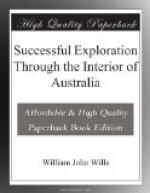It is proposed here to erect an obelisk to his memory, and I am about to get one of the streets named after him. I cannot commit myself to write further on the subject, but will conclude by subscribing myself,
Yours, ever faithfully,
P.A. Jennings.
W. Wills, Esquire, M.D.
. . .
From Dr. Mueller.
December 11th, 1861.
My dear doctor,
His Excellency informed me by note last night that Mr. Heales thinks to leave the consideration of everything connected with the great and glorious enterprise of your son and Mr. Burke, to the Commission, which Mr. Heales will probably have installed before leaving office.
His Excellency adds, that every thought shall be given, that the family who immortalized their name by the work of your lamented son shall not be forgotten. I hope to be in town to-morrow, and will do myself the pleasure of calling on you.
Very regardfully yours,
FERD. Mueller.
. . .
The Melbourne Advertiser, of December the 4th, 1861, contained the following leading paragraph:
It is the intention of Mr. O’Shanassy to place a sum of 5000 pounds on the Estimates towards the erection of a national monument to Burke and Wills, and it is believed a like amount will be raised by public subscription in various parts of the colony; so that the aggregate amount will enable us to raise a memorial worthy of Victoria, and worthy of the heroes whom we design to honour. This is as it should be. Burke and Wills achieved a splendid exploit: their lives were the forfeit of their daring; and we owe it to their reputation, as well as to our own character, to preserve a durable record of their great achievement, and to signalize to after-ages our admiration of its simple grandeur, and our gratitude to the brave men who accomplished it. A time will come when a belt of settlements will connect the shores of Port Phillip with those of the Gulf of Carpentaria; when, on the banks of the Albert or of the Flinders, a populous city will arise, and will constitute the entrepot of our commerce with the Indies; and when beaten roads will traverse the interior, and a line of electric telegraph will bisect the continent. The happy valley of Prince Rasselas was not more verdant or more fertile than much of the country passed through by the explorers, whose loss we deplore; and it is certain that these beautiful solitudes will be rapidly occupied by the flocks and herds of the squatter. Agricultural settlements will follow; towns and villages will be established, gold-fields probably discovered, and waves of population will overflow and will fertilize vast tracts of country which we have hitherto concluded to be a sterile desert. These events will owe their initiation to the adventurous pioneers who first crossed the continent from sea to sea. Theirs




